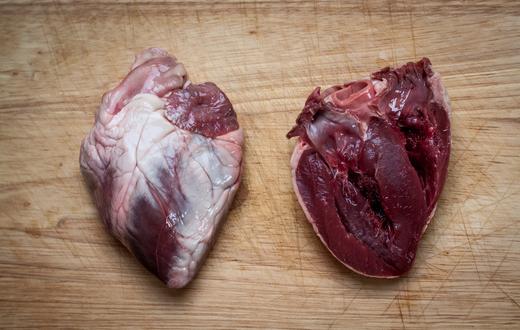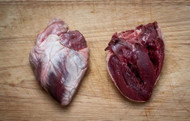Taurine in Pet Food – Dissolving Misconceptions
2021 Jun 15th

If you have been anywhere on a pet forum on social media recently you have read or heard from someone about the lack of taurine in grain free pet foods causing deficiencies in dogs. I would like to take this opportunity to shed some light and dissolve this misconception and its influence on our pets. All of the things stated in this blog post are not opinion based, they are based on science and we have done our research and will reference articles when appropriate. I will also add links to articles at the end of the blog for you to peruse. (Just a warning, this is a bit of a long read, but it’s necessary to get the point across).
First, let’s discuss what taurine is and what a taurine deficiency looks like in pets. Taurine is an amino acid that in most mammals is synthesized from a different amino acid called cysteine and is therefore not required (2). However, cats, and it has now been shown some breeds of dogs, cannot synthesize it in this way at all or not as efficiently. It is a required nutrient in cat food for this reason, but not in dog food since they are believed to be able to make their own. We believe that any nutrient like this that is on the fence whether it is required or not should be included in a food anyways. Taurine deficiency symptoms include blindness caused by retinal degradation, cardiomyopathy often characterized by an enlarged heart, progressing to lethargy, digestive upset, permanent blindness and even death (1). Taurine deficiency does not show up right away and can take from months to years to show up.
There have been quite a few articles recently claiming that grain free foods cause taurine deficiency in dogs. Taurine deficiency can be a major problem and is a concern, we are not denying that. However, these articles claim that the only foods that have enough taurine in them are those with grains that add a synthetic or concentrated form. However, taurine is not present in grains. By not present, I do not mean that it is there in very small amounts, I mean grains do not contain ANY taurine. In fact, fruits, vegetables, legumes, and grains all do not contain taurine. On the other hand, taurine IS available from various other food sources including meat, dairy, eggs, moss, and yeast. This information comes from a study done by the Department of Molecular Biosciences, School of Veterinary Medicine at the University of California (3). Therefore, if you are looking for a food high in taurine then you should be looking for a food high in meat content. It is true that high temperatures can denature taurine and make it unusable, however good, high quality brands such as Valens and Orijen cook foods at lower temperatures so most of the taurine will stay intact and accessible.
With all of this knowledge, below I listed some ingredient lists of prescription veterinary pet foods recommended in these articles. One article states that you should “stop reading the ingredient list”(the article is linked below (4)) in order to help you choose a better pet food, but if you read their ingredients you can see why they would recommend this.
Purina Prescription HA Vegetarian:
Ingredients: Corn starch, hydrolyzed soy protein isolate, coconut oil, partially hydrogenated canola oil preserved with TBHQ, powdered cellulose, tricalcium phosphate, dicalcium phosphate, corn oil, potassium chloride, guar gum, salt, choline chloride, magnesium oxide, DL-Methionine, taurine, zinc sulfate, Vitamin E supplement, ferrous sulfate, manganese sulfate, niacin (Vitamin B-3), copper sulfate, Vitamin A supplement, calcium pantothenate (Vitamin B-5), thiamine mononitrate (Vitamin B-1), riboflavin supplement (Vitamin B-2), Vitamin B-12 supplement, garlic oil, pyridoxine hydrochloride (Vitamin B-6), folic acid (Vitamin B-9), Vitamin D-3 supplement, calcium iodate, biotin (Vitamin B-7), menadione sodium bisulfite complex (Vitamin K), sodium selenite
Hills Prescription w/d Diet:
Ingredients: Whole Grain Wheat, Whole Grain Corn, Powdered Cellulose, Chicken Meal, Corn Gluten Meal, Whole Grain Sorghum, Soybean Mill Run, Chicken Liver Flavor, Pork Fat, Soybean Oil, Pork Liver Flavor, Lactic Acid, Caramel color, Potassium Chloride, Choline Chloride, L-Lysine, vitamins (Vitamin E Supplement, L-Ascorbyl-2-Polyphosphate (source of Vitamin C), Niacin Supplement, Thiamine Mononitrate, Calcium Pantothenate, Pyridoxine Hydrochloride, Vitamin A Supplement, Vitamin B12 Supplement, Riboflavin Supplement, Biotin, Folic Acid, Vitamin D3 Supplement), Iodized Salt, minerals (Ferrous Sulfate, Zinc Oxide, Copper Sulfate, Manganous Oxide, Calcium Iodate, Sodium Selenite), Taurine, L-Carnitine, Calcium Sulfate, DL-Methionine, L-Threonine, L-Tryptophan, Mixed Tocopherols for freshness, Natural Flavors, Beta-Carotene
Royal Canin Prescription Vegetarian
Ingredients: Oat groats, brewers rice, potato protein, coconut oil, natural flavors, dried plain beet pulp, tomato pomace, flaxseed, calcium carbonate, monocalcium phosphate, carrot pomace, potassium chloride, calcium sulfate, salt, fructooligosaccharides, choline chloride, taurine, vitamins [DL-alpha tocopherol acetate (source of vitamin E), L-ascorbyl-2-polyphosphate (source of vitamin C), biotin, D-calcium pantothenate, vitamin A acetate, niacin supplement, pyridoxine hydrochloride (vitamin B6), thiamine mononitrate (vitamin B1), vitamin B12 supplement, riboflavin supplement, folic acid, vitamin D3 supplement], trace minerals [zinc proteinate, zinc oxide, ferrous sulfate, manganese proteinate, manganous oxide, copper sulfate, calcium iodate, sodium selenite, copper proteinate], L-carnitine, carotene, rosemary extract, preserved with mixed tocopherols and citric acid.
Notice that in all of three of them there are only 1-3 ingredients that contain taurine, including a taurine supplement. Yes, this taurine supplement would boost the taurine levels. However, you should question, as concerned pet owners, where this taurine is coming from as well because synthetic taurine has less nutritional value than naturally occurring taurine and naturally derived taurine supplements. As a contrast, the below foods are two foods that would naturally have high levels of taurine.
Valens Pasture:
Ingredients: Fresh deboned lamb, fresh deboned beef, fresh deboned boar, fresh deboned bison, lamb meal, porcine meal, lamb liver, beef liver, boar liver, peas, sweet potatoes, pea protein, Lamb Liver Vita Cube, flaxseed, porcine fat (preserved with mixed tocopherols and citric acid), natural flavour, dicalcium phosphate, tomato pomace, cod liver, calcium carbonate, salt, yeast culture, potassium chloride, dried Saccharomyces cerevisiae fermentation extract, choline chloride, chicory root extract, kelp meal, L-carnitine, blueberries, carob, cranberries, ginger root, apples, dried Lactobacillus fermentation extract, yeast extract, elderberries extract, rosemary extract, thyme extract, Yucca Schidigera extract, carrots, spinach, pumpkins, dehydrated Lactobacillus acidophilus fermentation product, dehydrated Lactobacillus casei fermentation product, dehydrated Bifidobacterium bifidum thermophilum fermentation product, dehydrated Streptococcus faecium fermentation product, glucosamine, chondroitin, zinc sulphate, ferrous sulphate, vitamin E, zinc proteinate, iron proteinate, niacinamide, calcium pantothenate, copper sulphate, manganous oxide, vitamin A, copper proteinate, riboflavin, thiamine mononitrate, manganese proteinate, pyridoxine hydrochloride, vitamin D3, calcium iodate, folic acid, sodium selenite, vitamin B12, green tea extract, turmeric root, fennel, paprika, cayenne
Orijen Original:
Ingredients: Fresh chicken meat (13%), fresh turkey meat (7%), fresh whole eggs (7%), fresh chicken liver (6%), fresh whole herring (6%), fresh whole flounder (5%), fresh turkey liver (5%), fresh chicken necks (4%), fresh chicken heart (4%), fresh turkey heart (4%), chicken (dehydrated, 4%), turkey (dehydrated, 4%), whole mackerel (dehydrated, 4%), whole sardine (dehydrated, 4%), whole herring (dehydrated, 4%), whole red lentils, whole green lentils, whole green peas, lentil fiber, whole chickpeas, whole yellow peas, whole pinto beans, whole navy beans, herring oil (1%), chicken fat (1%), chicken cartilage (1%), chicken liver (freeze-dried), turkey liver (freeze-dried), fresh whole pumpkin, fresh whole butternut squash, fresh whole zucchini, fresh whole parsnips, fresh carrots, fresh whole red delicious apples, fresh whole bartlett pears, fresh kale, fresh spinach, fresh beet greens, fresh turnip greens, brown kelp, whole cranberries, whole blueberries, whole saskatoon berries, chicory root, turmeric root, milk thistle, burdock root, lavender, marshmallow root, rosehips, enterococcus faecium
Valens contains 11 ingredients with naturally occurring taurine, and Orijen contains 16! It should be noted that almost NO dog foods list taurine levels on their bags (even the prescription diets that add it) since it is not a required nutrient in dogs. Cat foods do list taurine however. For this reason some studies we mention on taurine and foods referenced are cat foods since there is very little research on dogs and taurine, but lots on cats. With this in mind, when comparing listed taurine levels in Orijen Cat and Kitten food with the Purina Prescription DH cat food, the Orijen food (which does not contain added taurine, just naturally occurring, and is a grain free food) contains 0.2% taurine, while the Purina Prescription diet only contains 0.13% taurine. This is a pretty definitive way of saying the amount of MEAT matters, not the presence or absence of grains.
To prove a point, below is a comparison to a hypothetical balanced grain free dog food that we put together. It contains all nutrients required by AAFCO for dogs.
Theoretical Grain Free Dog Food High in Taurine:
Ingredients: Turkey Neck, Turkey, Trout, Turkey Back, Egg, Turkey Liver, Pumpkin, Squash, Chick Peas, Lentils, Tomato, Apple, Dicalcium Phosphate, Cod Liver, Montmorillonite Clay, Algal Oil, Burdock Root, Thyme, Pink Himalayan Salt, Blueberry, Cranberry, Kelp, Rosemary, Egg Shell, Zinc Proteinate, Vitamin E, Copper Proteinate
It contains only six ingredients containing taurine and is grain free, yet has 0.35% taurine. This is over 2.5 times higher than the prescription cat food taurine level. This is because there is a high amount of meat, not grains.
There is definitely an area of concern when it comes to taurine levels, but the issue is with foods low in meat content that do not add taurine, regardless of if they are grain free or not. If you go to the grocery store or big box store and grab a food that is over 90% corn and wheat and less than 1% meat by-products, and does not add taurine as a supplement, then these are the foods you should be concerned about causing deficiencies (…and not just with taurine…). Our concern with the articles that are coming out about dogs and taurine deficiency is the fact that they do not simply say that taurine deficiency is an issue and you should make sure the pet food you are feeding contains it. They instead generalize by saying that grain free foods and boutique foods are the cause, avoiding naming specific brands. However, they do name their own brands (Purina, Hills, Royal Canin). These articles therefore feel like a direct attack on stores like our own, which provide good quality, high meat content pet food. This is especially true since good food is associated with the term “grain free.” For example, the Cummings Veterinary Medical Centre wrote an article stating in their title that “boutique or grain-free diets” cause a risk in heart disease (4). It is right to raise awareness about this issue, that I agree with, we are not saying taurine deficiency in dogs does not happen. However, it is not right for them to misinform the public and generalize every grain free diet like they are all made equal. I have heard many people afraid because their vet made them feel like their dog was going to die unless they bought vet food due to this issue.
If you are someone who is very concerned about taurine-related issues in dogs you can try contacting AAFCO (Association of American Feed Control Officials), whom are responsible for setting guidelines for nutrients in pet foods. Trying to convince them to make taurine an essential nutrient in dog food is the only way to fix the issue of taurine deficiency in some dog foods.
- https://nasc.cc/pet-university/taurine-deficiency-cats/
- https://www.ncbi.nlm.nih.gov/pmc/articles/PMC1790081/pdf/canvetj00278-0010.pdf
- https://www.vetmed.ucdavis.edu/sites/g/files/dgvnsk491/files/aal/pdfs/spitze.pdf?fbclid=IwAR05Oc-VWeNS6HTiFZZjQHzrOX9raMPeNOgngssyZTryTWPlUW3Bxn9YAbs
- http://vetnutrition.tufts.edu/2018/06/a-broken-heart-risk-of-heart-disease-in-boutique-or-grain-free-diets-and-exotic-ingredients/

